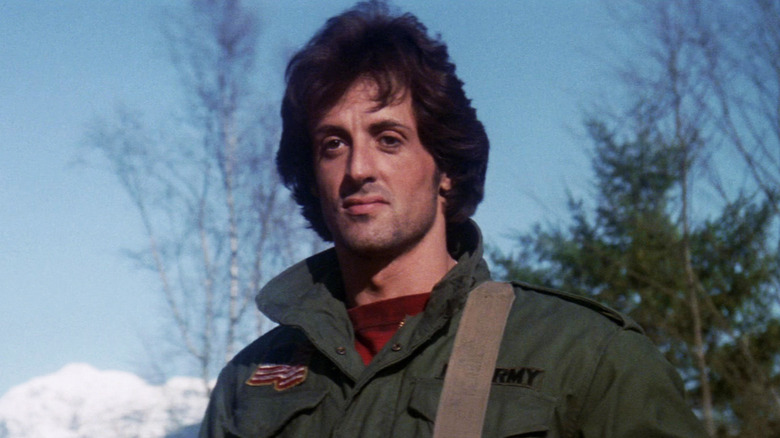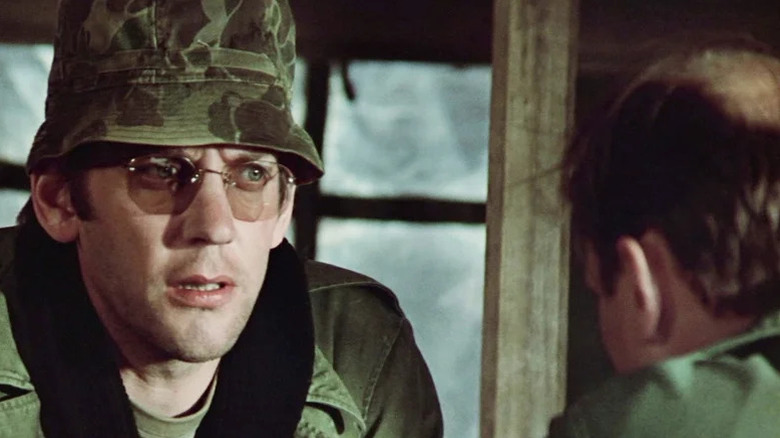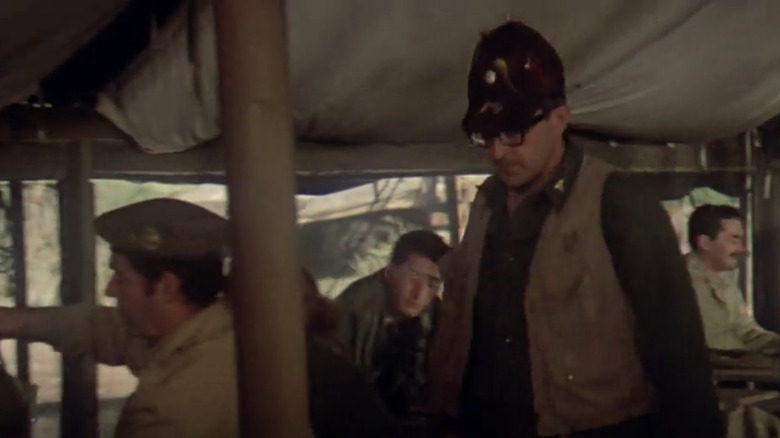Sylvester Stallone Made An Uncredited Appearance In One Of The Greatest War Movies Ever
The simple version of Sylvester Stallone's rise to fame has it that the young actor wrote "Rocky" and cast himself in the lead role, thus becoming a star overnight. Indeed, a 1978 Playboy interview began by recalling how, with that 1976 movie, Stallone had "burst upon the American movie scene like a Roman candle." As is so often the case with these things, however, Stallone hadn't simply transformed his life overnight — he'd been struggling to break through for some time.
That very same interview with Playboy also detailed how Sly had "spent many years waiting in the wings for his career to take off," which wasn't just a metaphor. Stallone's acting career prior to "Rocky" consisted of him playing what he termed in a 1977 BBC interview to be "atmosphere." That is, after moving to New York in 1969, he spent years as an extra, playing "the guy that was being the drunk that was being stepped over in the gutter," while supporting himself by working as an usher at a movie theater and by cleaning the lions' cage at the Central Park Zoo.
It wasn't until 1972 that he began writing, blacking out the windows of his small apartment and writing by candle light so as to remain unaware of whether it was day or night outside. By that point, Stallone had given up on acting, and considering his experience in the industry, it's not hard to see why. Stallone would star in some egregious stuff after his career took off, perhaps most memorably being tricked into a terrible comedy by his rival Arnold Schwarzenegger, but things were much worse in the pre-"Rocky" years. By 1972, Sly had only been in a handful of plays and films, one of which was a 1970 soft-core sexploitation flick named "The Party at Kitty and Stud's," in which he starred after being thrown out of his apartment and sleeping at the Port Authority Bus Terminal. But at least it was a starring role, unlike his other projects from that same year, which included a role in the "M*A*S*H" movie that might be the smallest part Stallone ever played.
M*A*S*H was a big hit with a tiny Stallone appearance
Before "M*A*S*H" became the legendary CBS series it's best known for today, it was a 1970 movie based on Richard Hooker's 1968 book "MASH: A Novel About Three Army Doctors." Directed by Robert Altman (who later made his dislike of the "M*A*S*H" TV series very clear), the movie starred the late Donald Sutherland as Captain Benjamin Franklin "Hawkeye" Pierce Jr. alongside Elliott Gould as Captain John Francis "Trapper John" McIntyre and Tom Skerritt as Captain Augustus "Duke" Forrest, all of whom worked as medical personnel stationed at the titular Mobile Army Surgical Hospital during the Korean War.
The three stars got a nice little career boost from the movie, which was a big success and also helped Altman establish himself as one of the most exciting directors of the burgeoning New Hollywood movement. Not only did "M*A*S*H" become the third highest-grossing film of 1970, critics were impressed, with The Hollywood Reporter's John Mahoney praising the film as "the finest American comedy since 'Some Like It Hot,' the 'Mr. Roberts' of the Korean War, 'The Graduate' of 1970, and the film that has been expected from director Robert Altman for some short time."
Surely, then, Sylvester Stallone was pleased to have been a part of such a seminal film. Well, he would have been if he'd had a role even slightly larger than "Soldier Sitting at Camp Table" — uncredited, I might add.
Sylvester Stallone played a green beret long before Rambo
After "Rocky" became a huge success and launched Sylvester Stallone's career, he quickly established what became his second-biggest cinematic franchise by starring as John J. Rambo in the "Rambo" movies. The inaugural film in that saga, 1982's "First Blood," saw him portray a Vietnam War veteran who, haunted by his experiences as a prisoner of war, returns to a United States that's actively hostile to his presence — at least in the small town of Hope, Washington, where Stallone's vet runs afoul of the local sheriff. The "Rambo" movies would get successively sillier and more bombastic as they went on, but there's no denying that John Rambo himself became a cinematic icon and one of the most celebrated action heroes of all time.
Back in 1970, however, Stallone had to content himself with playing "Soldier Sitting at Camp Table" in "M*A*S*H," a role that saw him depicted on-screen for a literal second after Donald Sutherland's "Hawkeye" arrives at the camp. Interestingly enough, his character is seen wearing a green beret (check him out on the left side of the image above), and John Rambo was a former green beret himself.
A New York Times piece from 1970 stated that extras were paid a "daily minimum of $29.15," suggesting this is roughly what Stallone earned for his time on "M*A*S*H." Considering he would soon be spending his nights at the Port Authority Bus Terminal, it sounds like he desperately needed it at the time. Meanwhile, it seems Robert Altman had no recollection of the younger Sly appearing in his film. Talking to the Los Angeles Review of Books in 2014, Elliot Gould recalled how Stallone had spoken to him about his "M*A*S*H" role years after the fact:
"Sylvester Stallone, who I've only met a couple of times, said he doesn't admit that he was ever an extra in any movie but he admits that he was an extra in 'M*A*S*H.' And when I told that to [Robert Altman] he said, 'No. I don't accept that Sylvester Stallone was in my movie. I don't accept it.'"


